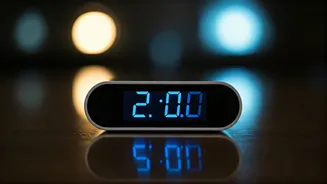Understanding Micro-Rests
Micro-rests are short breaks, lasting only a minute or two, designed to give your brain a chance to recharge. Unlike longer, more formal rest periods,
these tiny respites can be seamlessly woven into your daily activities. They are incredibly effective because they counteract the effects of mental fatigue and information overload. When you engage in tasks that demand constant focus, your brain's resources gradually deplete, which leads to decreased concentration and compromised memory. Micro-rests offer a quick opportunity to replenish these cognitive resources, making you feel refreshed and mentally alert. These small pauses help clear the mental clutter, allowing your mind to process information more effectively and retain memories with greater ease. They can involve anything from closing your eyes and taking a few deep breaths to simply looking away from your screen for a moment.
Implementing in Daily Life
Incorporating micro-rests into your routine is straightforward and adaptable to your lifestyle. You can set a timer to remind yourself to take a short break every 20-30 minutes, or you can use your natural work rhythms as cues. For example, after completing a specific task or reading a chapter, pause for a micro-rest. During your break, step away from your work, stretch, take a short walk, or listen to calming music. Another helpful strategy is to practice mindful breathing. Inhale deeply through your nose, hold your breath for a few seconds, and exhale slowly through your mouth. This simple exercise can quickly calm your nervous system and increase mental clarity. Additionally, consider looking away from your computer screen every 20 minutes to rest your eyes and give your brain a break from processing information. Even a minute of gazing at a distant object can make a huge difference in your focus and memory.
Benefits for Memory
The primary benefit of micro-rests is their profound impact on memory. When you take frequent, short breaks, you enable your brain to consolidate information more efficiently. This consolidation process is vital for converting short-term memories into long-term memories. By regularly resting, you optimize your brain's capacity to process and store new information. Furthermore, micro-rests help reduce cognitive fatigue, which is a major impediment to memory function. When your brain is tired, it struggles to encode and retrieve information accurately. Micro-rests reduce that fatigue, thereby increasing attention span and focus, making it easier to absorb and recall details. They support the overall health of your brain, as consistent rest lowers stress levels, thus providing a better environment for optimal brain performance. The act of taking a short rest period can also lead to creative insights and solutions, making it a valuable tool for anyone looking to improve both memory and thinking.
Scientific Perspective on Rests
The effectiveness of micro-rests is supported by a growing body of scientific evidence. Research indicates that frequent short breaks can improve cognitive performance by enhancing blood flow to the brain, which increases oxygen and nutrient supply. Furthermore, these breaks have been found to promote neuroplasticity, the brain’s ability to change and adapt. This helps improve cognitive function and memory. Studies also show that during micro-rests, the default mode network (DMN), a set of interconnected brain regions, becomes more active. The DMN is associated with self-reflection, mind-wandering, and creativity. By allowing the DMN to activate, micro-rests can facilitate the processing of information and help in making connections. These connections enhance memory formation. Moreover, the act of briefly disengaging from intense cognitive tasks can reduce the release of stress hormones like cortisol, which can negatively affect memory performance.
Maximizing Micro-Rest Benefits
To fully leverage the advantages of micro-rests, you should tailor them to your personal needs and preferences. Experiment with different types of breaks to discover what works best for you. This might involve listening to soothing music, taking a short walk outside, or simply closing your eyes and focusing on your breath. Be consistent in your practice and make micro-rests an integral part of your daily routine. Avoid using these breaks to engage in activities that could lead to further mental strain, such as checking emails or social media. Instead, try to create a calm and refreshing atmosphere. Consider using apps or timers to remind yourself to take breaks at regular intervals. It is also essential to ensure you are getting enough sleep each night, as sleep plays a crucial role in memory consolidation. When combined with sufficient sleep and a balanced lifestyle, micro-rests can be a powerful tool for optimizing your cognitive function and enhancing your overall well-being.













